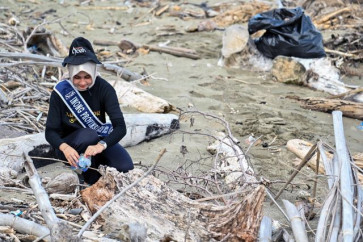Popular Reads
Top Results
Can't find what you're looking for?
View all search resultsPopular Reads
Top Results
Can't find what you're looking for?
View all search resultsHuman health should take center stage in plastic treaty negotiation
Over 7,000 substances are associated with plastics, and more than 3,200 of them have hazardous impacts on the environment and human health.
Change text size
Gift Premium Articles
to Anyone
S
ome 53 million tonnes plastic waste may enter aquatic ecosystems per year by 2030. This will not only affect aquatic species but also humans through the fish and aquatic foods they consume.
A new study has found that microplastics are now detected in the air and rain, meaning that whether we like it or not, our lives are surrounded by plastic and plastic pollution.
Plastics that enter our body could increase the risk of cancer and disrupt our endocrine system.
Furthermore, plastic plants along the lower Mississippi River contribute to the highest rates of cancer in the United States among marginalized communities in a place called “Cancer Alley”, Louisiana.
At the beginning of the third session of the Intergovernmental Negotiating Committee to develop an international, legally binding instrument on plastic pollution, including in the marine environment (INC-3) in Nairobi from Nov. 11 to 19, the zero draft that has been prepared by the INC chair after INC-2 in Paris is a good place to start for a substantive negotiation. This is because, at least now, member states have more concrete material to discuss during the incoming INC process.
The draft is divided into three major parts: the general provision, which consists of provisions such as objectives and definitions; the core obligations, which cover obligations such as reduction, reuse and redesign; and finally, the means of implementation, such as financing, national plans, transfers of technology and other provisions that could support members in implementing the treaty.
Although the draft offers broad options and sub-options for the members to discuss during the INC-3, from ambitious to less ambitious options, the overarching focus of this draft should be on human health and environmental protection.



















